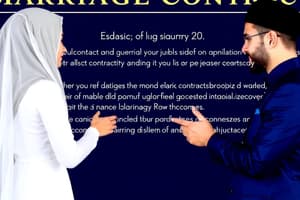Podcast
Questions and Answers
ما هو المقصود بالقذف؟
ما هو المقصود بالقذف؟
- هو تهديد شخص ما بأذى جسدي
- هو الإساءة إلى شخص معين بألفاظ جارحة
- هو رمي العرض لاي للفظ كان حتى وان كان هذا اللفظ الداخل في التوريع (correct)
- هو نشر معلومات كاذبة عن شخص ما
ما هي عقوبتي من يقذف العرض؟
ما هي عقوبتي من يقذف العرض؟
- عقوبة مالية فقط
- عقوبة بدنية وعقوبة غير بدنية (correct)
- عقوبة بدنية فقط
- لا توجد عقوبات على من يقذف العرض
ما هو الفرق بين الزواج العرفي والزواج الآخر؟
ما هو الفرق بين الزواج العرفي والزواج الآخر؟
الفرق بين الزواج العرفي والزواج الآخر أنّ الزواج العرفي غير موثّق في سجلات الدولة، بينما الزواج الآخر مُوثّق في سجلات الدولة.
ما هو الفرق بين الحق الشخصي والحق العيني؟
ما هو الفرق بين الحق الشخصي والحق العيني؟
هل الزواج العرفي شرعيّ تماماً ؟
هل الزواج العرفي شرعيّ تماماً ؟
هل تُسمع دعوة زوجيه عند الانكار ما لم يكون العقد موثقاً ؟
هل تُسمع دعوة زوجيه عند الانكار ما لم يكون العقد موثقاً ؟
ما هو الدليل على أن الصلاة واجبة؟
ما هو الدليل على أن الصلاة واجبة؟
ما هو الدليل على أنّ أكل مال اليتيم حرام ؟
ما هو الدليل على أنّ أكل مال اليتيم حرام ؟
ما هو الفرق بين ______ و ______ ؟
ما هو الفرق بين ______ و ______ ؟
Flashcards
عقد الزواج
عقد الزواج
عقد الزواج من العقود الجامدة الغير مرنة، الموضوع في عقد الزواج هو الطاعة، بينما الموضوع في العقود الأخرى هو المال.
جمود عقد الزواج
جمود عقد الزواج
ضوابط عقد الزواج لا يمكن لأي من طرفي عقد الزواج التخلي عنها، فهي منظمة لحماية الأعراض وتضمن حقوق كلا الطرفين.
شروط عقد الزواج
شروط عقد الزواج
عقد الزواج له شروط صحة، وشروط نفاذ، وشروط لزوم.
طرق فسخ عقد الزواج
طرق فسخ عقد الزواج
Signup and view all the flashcards
Study Notes
Week 1 Lectures - Summary
-
Islamic Law (Lecture 1): Marriage contracts are considered rigid and unchangeable; other contracts are flexible or subject to specific conditions. Marriage contracts have conditions for validity, enforceability, and obligation. Invalid, unenforceable, and obligatory conditions exist to protect both spouses and children. Dissolution of marriage includes divorce, khul'a, i'la', and zihar.
-
Islamic Law (Lecture 1): Inheritance is barred under specific conditions like slavery, murder, and religious differences; certainty is preferred over doubt. Wills are binding on the testator but not on the beneficiary. Contracts in Islamic jurisprudence fall into one of three categories:
- Mutual exchange (e.g., sale, rent)
- Pure gifts (e.g., wills)
- Dual-purpose (e.g., marriage)
-
Fundamentals of Islamic Jurisprudence: This subject has five key concepts:
- Origins of jurisprudence.
- Historical roots of jurisprudence.
- Necessity for jurisprudence.
- Evidence within jurisprudence.
- Legal rulings.
-
Civil Law (Lecture 1): Civil law is concerned with relationships between individuals, contrasting with public law, which deals with individuals and the state. Civil rights are divided into personal and property rights. Property rights are stronger than personal rights. Property rights are permanent, unique, apply to specific objects, allow for action against the object, and include possession.
-
Public Law: Property rights are mostly considered as property ownership. Types of property rights include usufruct (right to use and benefit from the property without owning it), servitude (right to make use of another's property, like a walkway), and rights of mortgage.
-
Civil Law (continued): Property ownership is fundamental to property rights. Other rights, such as usufruct, servitude, and rights of dwelling, are often subordinate to those of ownership. Property can take various forms: immovable (land), movable (other assets).
-
Public Law Continued: Common property (resources like air, water, and wildlife) is not subject to individual ownership. Abandoned property becomes the possession of the first party to take possession of it. Value is not restricted to monetary or commercial worth, intangible assets exist as well.
-
Civil Law (continued): The validity of customary marriage (is considered permissible). The conditions for customary marriage are that the essential requirements are fulfilled. Not all property rights are equivalent.
-
Fundamentals of Jurisprudence (continued): Legal principles may be explicit (mentioned in texts) or implicit (understood). This distinction is critical in jurisprudence. Principles should cover both the known and the unknown. Legal sources may address general situations for particular individual or situational circumstances .
-
Islamic Jurisprudence and Rules of Evidence: Rules of evidence are a key part of the interpretation of religious texts and their application to legal situations. Islamic law attempts to reconcile the finite and infinite in legal practice. Interpretative effort can be needed to achieve the best interpretation of text and circumstance.
-
Civil Law (continued): Discussion of property rights and related concepts. Rules around ownership, limitations on ownership, and different types of property rights.
-
Fundamentals of Jurisprudence (continued): Obligatory, prescribed, and optional actions are detailed in Islamic jurisprudence, along with the different ways in which these concepts can intersect.
-
Civil Law (continued): Property rights are discussed.
-
Civil Law (continued): Property rights are discussed.
-
General Principles of Law: Concepts including necessary, recommended, forbidden (haram), discouraged (makruh), and permissible activities are all detailed in terms of various forms of evidence .
Studying That Suits You
Use AI to generate personalized quizzes and flashcards to suit your learning preferences.




